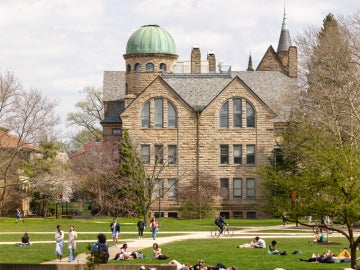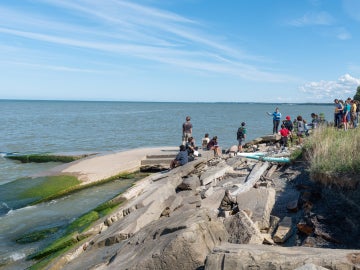At This Conference, You’re Family
October 11, 2017
Amanda Nagy

From top left, Nicollette Mitchell '13, Kopo Oromeng '17, Marcus Hill '19 and Shannon Banks '19. The group presented their research at the National Association of Black Geoscientists annual conference.
Photo credit: Tanya Rosen-Jones
Obies earn top prizes for their research presentations at the National Association of Black Geoscientists annual conference.
Much like has been observed in many areas of the world, climate change has become more noticeable and extreme in the Amazon basin. Over the past three decades, scientists have observed declining precipitation rates in some parts of the Amazon rainforests, followed by loss of vegetation and stalled tree growth. Record-breaking floods have been punctuated by “once-per-century” drought events.
Paleoclimatology is a branch of geoscience that studies past climates. Since it’s not possible to go back in time to determine what climates were like, scientists use proxies, such as charcoal samples, to track environmental changes.
For her master’s thesis at the University of Arizona, Nicollette Mitchell ‘13 reconstructed past climates in the areas around paleolakes in the Amazon. Mitchell’s research has produced a multi-century record of past precipitation, from which the data can be used to make predictions about the Amazon’s resilience to climate variability. Fourth-year Kopo Oromeng played an integral role in this work when she interned with Mitchell’s paleoclimate research lab in summer 2017.
Both Mitchell and Oromeng received top prizes for presentations of their research at the National Association of Black Geoscientists (NABG) annual conference in September. They were joined by third-years Shannon Banks and Marcus Hill, who also presented their work.
Mitchell returned to Oberlin this fall as the college’s first Howard Hughes Medical Institute (HHMI) Inclusive Excellence fellow. Oberlin is one of 24 institutions in the nation to be awarded a $1 million grant for the Inclusive Excellence initiative, which promotes the success of all students in STEM (Science, Technology, Engineering, Math). In her role as the HHMI fellow, Mitchell is working with students and partners across campus to develop targeted student programming and nurture STEM access, engagement, and success.
Oromeng, a geology and economics major, met Mitchell for the first time at the NABG conference in 2016. “She was the first black female geologist I ever met, so obviously I was excited to meet her,” recalls Oromeng, who is from Kanye, Botswana.
They reconnected when the geology department invited Mitchell to campus to give a talk about her master’s research. Oromeng was looking for a summer internship, and with guidance from her advisors, geology professors Karla Hubbard and Dennis Hubbard, she applied for a summer research position in Mitchell’s department at the University of Arizona.
“I was the lab manager for my research group, and I was able to advocate for Kopo to be hired for summer research,” explains Mitchell. “I created a project for her from some of my master’s thesis work, and she had the opportunity to participate in all parts of a paleoclimatology project—sample preparation, analysis, and interpretation. I gave Kopo the tools she needed, and she did all the hard work to earn her poster presentation award.”
Oromeng received the prize for best student poster presentation, while Mitchell was awarded best oral presentation.
Mitchell says the NABG is unlike any other conference she has ever attended in the field of geosciences because it feels like a family reunion. “It affords one-on-one interactions with black scientists who are program managers at the National Science Foundation, presidents at global oil companies, graduate students at top research institutions, and other scholars who may feel isolated in their day-to-day jobs. Representation is particularly important for students in historically disenfranchised groups, so I am a proponent for specialized conferences like NABG.”
Participation in conferences is an invaluable opportunity for undergraduates, Mitchell says, because it allows student to build a social and professional network and lay the groundwork for future collaborations—as was the case for Oromeng, who was seeking lab experience in a specialized research area.
“Presenting at a conference also gives students the experience of communicating with a non-expert audience, which makes for more well-rounded scientists and builds a strong CV for life after Oberlin,” Mitchell says.
After Oberlin, Oromeng says she will be focused on the continent of Africa and its development.
“Doing science research that is relevant and connects me to my roots and home is important,” she says. “In the future, I would like to do more geology or environmental policy-related research in Africa.”
You may also like…
Oberlin Launches Critical AI Studies Minor in Fall 2026
With a solid foundation in both science and the humanities, this minor ensures students to understand and be able to analyze the ethical, cultural, environmental, political, economic, technological, and labor effects of AI.
Research Roundup
Every day, Oberlin’s faculty and students produce scholarly work that uncovers new insights into how we understand the world, particularly in the areas of sustainability and the environment.
Three Things with Jillian Scudder
Oberlin’s astrophysicist-author shines a light on our dark universe.


